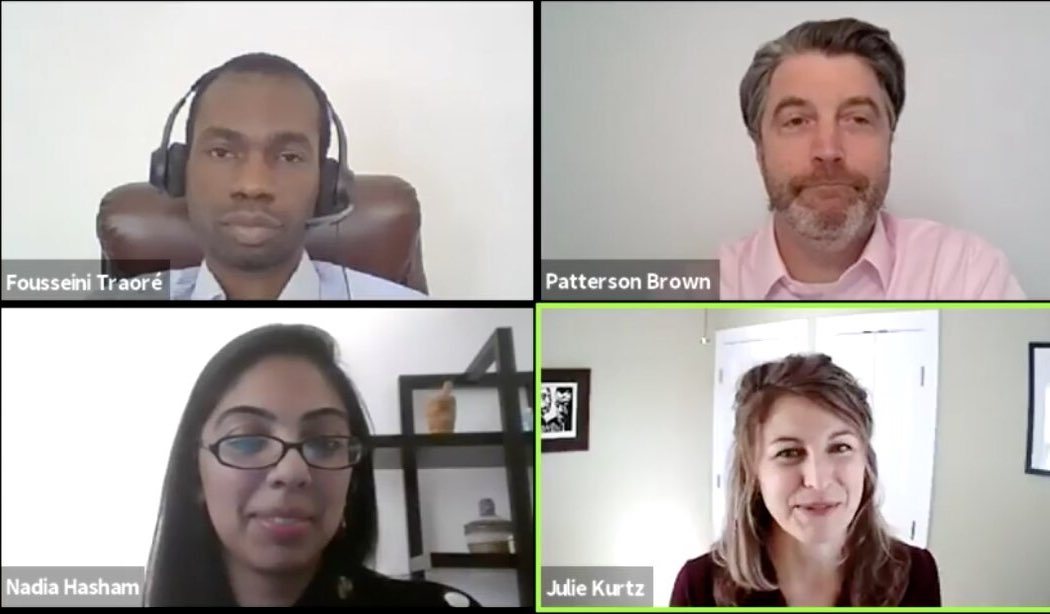Millions of people in Africa rely on informal trade for their livelihoods. In some African countries, the share of informal exports nearly surpasses the share of formal exports. Nevertheless, data surrounding informal trade remains scarce. This problem of invisibility makes it difficult for researchers and policy makers to understand the realities of informal trade, including the daily challenges and precarious existence that traders—particularly women—face.
“At some border crossings between African countries, customs controls account for most or all of the food and agricultural goods that flow between country borders. At other borders, formal trade statistics tell us next to nothing about the real quantity of the goods crossing the borders,” said IFPRI Research Analyst Julie Kurtz at the start the Dec. 3 IFPRI virtual policy seminar, “Informal African Trade: The Hidden World of Food Flows.”
Informal cross-border trade (ICBT) takes many shapes, from unregistered traders working entirely outside of the formal economy to formal firms that partially evade regulations. One of the major drivers of ICBT is poverty, said IFPRI Research Fellow Fousseini Traoré. A lack of formal jobs pushes people into the informal sector, and some of those people end up as informal cross-border traders. ICBT is a vital source of income; the average informal cross-border trader has eight dependents, according to a World Bank survey in West Africa. Other drivers of ICBT include high tariffs and export taxes, quotas, complex regulations, and inefficient customs procedures.
Direct, survey-based methods are the best way to measure ICBT, Traoré said. Brahima Cissé, an expert at the Permanent Interstate Committee for Drought Control in the Sahel (CILSS), spoke about one such direct methodology: An Android application that data collectors across value chains use to report day-to-day cross-border trade flows, including the values and volumes of goods crossing the border. Currently, it is being used to monitor trade across 19 corridors and 16 countries in West Africa, and in 2019, 15 ECOWAS member states adopted it. “We are confident that we have a unique methodology of day-to-day monitoring systems along corridors in West Africa,” Cissé said. “And this methodology gives us very interesting figures.”
Most cross-border traders (up to 70%) are women, and they face significant inequalities, said Nadia Hasham of the UN Economic Commission for Africa (UNECA)’s African Trade Policy Centre. “At the border, some of the things we’ve seen were limited knowledge of trade regulations and policies, sexual harassment, corruption, and extortion, [inadequate access to finance], and inadequate infrastructure,” Hasham said.
These gender inequalities lead to inefficiencies and reduced agricultural output. Hasham suggested a list of opportunities to reduce the gender barriers in ICBT. Simple solutions like placing female gender champions at borders, designing gender-sensitive training for border officials, and having gender-differentiated toilets at borders can all help, she said. Hasham also reaffirmed the importance of data on ICBT, especially sex-disaggregated data. “This is critical for evidence-based decision making.”
Patterson Brown, Senior Trade Advisor at USAID’s Bureau for Resilience and Food Security, and IFPRI Senior Research Fellow Antoine Bouët echoed the same sentiment, stressing the need for coordinated up-to-date trade data. “We still have a lot to learn… about informal trade across the whole African continent,” Bouët said. “Not only for West Africa but for all African regions.”
Timothy Karoff is a former IFPRI Communications Intern.







